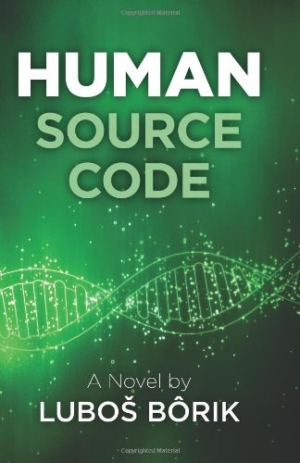
Human Source Code
This intriguing thriller features nonstop action and stakes that get higher and higher right up until the very end.
Question #1: Is it OK to kill another human being? Question #2: What if that human being were Adolf Hitler or someone like him? In the scientific thriller Human Source Code, geneticists believe they have found the root of all evil in humanity, and they take it upon themselves to eliminate the murky end of the gene pool. Lubos Borik comes down on the side of the law here, making his protagonist a British detective, but he gives enough of the other side of this moral dilemma to provoke some thought. He successfully interweaves scientific thriller with crime drama, creating a complex story that questions how far humanity can, and should, go in the search for genetic answers.
In this debut novel, the action rarely slows as Borik deftly guides his hero, Mike Klapman, through an ever-widening circle of suspects that leads to an international clandestine organization with ties to the FBI. As the investigation snowballs, Borik skillfully adds more and more characters on both sides of the law, managing to keep them each distinct and organized so the story doesn’t become confusing. He seamlessly weaves aspects of psychology, spirituality, biology, genetics, and police and military strategy into the plot as each new discovery ramps up the level of danger.
There is plenty of intrigue here, but suspense is lacking. Significant information about the characters is offered fairly quickly, and not much is held back. For instance, the main hit man’s motive is revealed right away. Likewise, not every character needs to be connected to the good guys or bad guys right away. Leaving affiliations ambiguous and letting the reader wonder where certain players belong, or if they’re double agents, would lend more excitement to the story.
In addition, the writing style feels clinical, like a formal report. In some ways this adds to the creepiness of the story, but it can also make it difficult to develop an emotional connection to the narrative. At points, the novel reads like a list of cold, hard facts: “Mary couldn’t sleep all night. Her husband had been nice to her that evening. She didn’t cry. He slept next to her without moving the whole night.” The reader is told how a character feels rather than being shown through physical details and actions.
The book itself is well designed, with an eye-catching cover layout and back cover copy that piques interest. A short time line of DNA research is also included at the back of the text. An author’s bio would be a welcome addition, as reading the story makes one curious about who conceived this complicated plot and how they know so much about bioengineering.
Overall, Human Source Code is an interesting story with nonstop action and stakes that get higher and higher right up until the end, and it will appeal to those who enjoy crime novels with a scientific twist. Readers will have to decide for themselves which side of this moral argument they fall on.
Reviewed by
Christine Canfield
Disclosure: This article is not an endorsement, but a review. The publisher of this book provided free copies of the book and paid a small fee to have their book reviewed by a professional reviewer. Foreword Reviews and Clarion Reviews make no guarantee that the publisher will receive a positive review. Foreword Magazine, Inc. is disclosing this in accordance with the Federal Trade Commission’s 16 CFR, Part 255.
